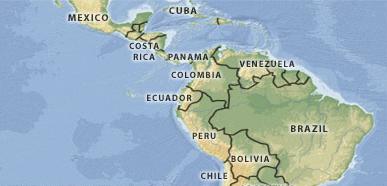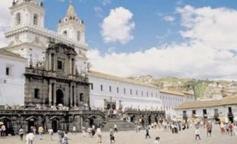![]()
South
America
Sept. 10,
2008: With two Russian Tu-160 “Blackjack” bombers
landing in Venezuela and new attention on Cuba by Russia, sufficient to spark
concern over a potential renewed interest on the Kremlin’s part in tinkering in
the Caribbean. Plus in Bolivia today, where activists have attacked a natural
gas pipeline and stormed public buildings, it is time to take a look at S.America:
Latin American
history is dominated by a singular thought: that the solution to the region’s
problems lies somewhere beyond the continent. During the past few years the
region began breaking away from that mindset, with many Latin American states
tinkering with policies to take matters in their own hands. This occurred on
both the left and right. Venezuela sought to use its energy resources to drive
Western oil firms from the region. Colombia buckled down for war rather than
wholly rely upon foreign aid. Argentina walked away from its foreign debt, and
Brazil began building its own infrastructure with its own money. However, Latin
America is coming of age and beginning to look internally to address problems,
rather than depending upon action from beyond the region.

Case Study S.America
P.1: Overview.

Case Study S.AmericaP.2: Economic Musings.
Case Study S.America
P.3: The Road to Independence.
Case Study S.America
P.4: Che and Castro.
Before Castro stepped
down today, he reached out to his old friend da Silva and Brazil. But da Silva
is not the Castroite he was 20 years ago. Case Study S.America P.5: From Chile to
Brazil.
In a May 6th, 2008
report The Council of Hemispheric Affairs suggests that the Shining Path is
financing their reviving terrorist activities by charging for protecting
drug-traffickers and intertwining the organization with coca production and
distribution networks. Research Report:
Not to long ago then,Venezuela's leader
once more threatened to cut off oil supplies to the USA. Hugo Chaves.
Also following the
Russo-Georgian war, several Latin American countries stepped forward to support
Russia. Nicaragua became the first country to recognize the independence of
Georgian breakaway regions South Ossetia and Abkhazia. As for Ortega’s recent
move, this is sure to grab Russia’s attention at a time when Russia is
looking for ways to keep the United States firmly focused anywhere but on
Russia itself.
Update Sept.29, 2008:
On Sunday, Venezuelan President Hugo Chavez announced that he had accepted an
offer from Russian Prime Minister Vladimir Putin to help Venezuela develop
nuclear energy – “for peaceful ends of course.” The Russian nuclear power
construction company Atomstroyexport, which is
currently building Iran’s new plant, will coordinate the project.
The two countries
have made no secret of their strategic partnership. Chavez boasts that he has
developed a "profound friendship" with Putin. Returning the
compliment, Putin declared that Russia and Venezuela are developing “our ties
in all spheres,” with “new possibilities in energy, high-tech, machine
construction and chemicals” and “cooperation in [the] military and technical
spheres.”
Fueling this
cooperation is a shared antagonism toward the United States. Both Chavez and
Putin have described the relationship as “multi-polar” – a term that describes
their opposition to “U.S. global domination.”
If the Russians and
Venezuelans are actually planning to develop nuclear weapons, that would
violate the 1969 Treaty of Tlateloco. Otherwise known
as the “Treaty for the Prohibition of Nuclear Weapons in Latin America and the
Caribbean,” it has been ratified by all 33 nations in the region.
Perhaps mindful of
such perils, Russia isn’t placing all its eggs into a Venezuelan basket.
Nicaragua’s military has been promised Russian replacement helicopters and
missiles, while Cuba gets “a new space-based communication station and new
aerial espionage capacities.” Together, Venezuela, Nicaragua and Cuba form a
strategic Caribbean triangle of anti-American nations and vital sea-lanes that
Russia is eager to control. According to Investors
Business Daily, “America imports 60% of its energy from overseas, and 64% of
that must cross the Caribbean to reach Gulf refineries, ports and pipelines.
Another portion must cross the Panama Canal. Russian communications operations,
submarines and naval ships hanging around with little to do are a problem, even
if a shot is never fired.
1 Nov.
2011: Anonymous activists threaten to expose Mexican drug
cartel secrets, here the context:
For updates
click homepage here
